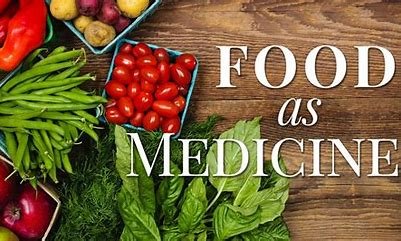Using food as medicine is a powerful concept that emphasizes the importance of nutrition in maintaining health and preventing disease.

1. Embrace Whole Foods
- Fresh Produce: Focus on fresh fruits and vegetables, which are rich in vitamins, minerals, antioxidants, and fiber. Aim for a variety of colors to ensure a wide range of nutrients.
- Whole Grains: Choose grains like brown rice, quinoa, oats, and whole wheat over refined grains. They provide essential nutrients and fiber.
2. Prioritize Plant-Based Foods
- Nutrient-Dense: Plant-based foods are packed with nutrients that support overall health.
- Phytonutrients: Fruits, vegetables, nuts, seeds, and legumes contain phytonutrients that have anti-inflammatory and antioxidant properties.
3. Healthy Fats
- Omega-3 Fatty Acids: Include sources of omega-3 fatty acids like flaxseeds, chia seeds, walnuts, and avocados to support heart and brain health.
- Avoid Trans Fats: Limit consumption of trans fats found in processed foods, as they can increase the risk of chronic diseases.
4. Stay Hydrated
- Water: Drink plenty of water throughout the day to maintain hydration and support bodily functions.
- Herbal Teas: Consider herbal teas like chamomile, peppermint, and ginger, which have various health benefits.
5. Balance Macronutrients
- Proteins: Include a variety of protein sources such as beans, lentils, tofu, tempeh, and nuts to support muscle and tissue repair.
- Carbohydrates: Choose complex carbohydrates like whole grains and starchy vegetables for sustained energy.
- Fats: Incorporate healthy fats like olive oil, nuts, seeds, and avocados.
6. Incorporate Fermented Foods
- Probiotics: Fermented foods like yogurt, kefir, sauerkraut, kimchi, and miso contain probiotics that support gut health.
- Digestion: These foods can improve digestion and boost the immune system.
7. Spices and Herbs
- Anti-Inflammatory: Use spices like turmeric, ginger, garlic, and cinnamon for their anti-inflammatory properties.
- Flavor and Health: Herbs like basil, parsley, cilantro, and rosemary add flavor and provide various health benefits.
8. Mindful Eating
- Listen to Your Body: Pay attention to hunger and fullness cues to avoid overeating.
- Slow Down: Eat slowly and savor each bite to improve digestion and satisfaction.
9. Limit Processed Foods
- Read Labels: Avoid foods with long ingredient lists and artificial additives.
- Homemade Meals: Prepare meals at home using fresh, whole ingredients to control what goes into your food.
10. Seasonal and Local
- Eat Seasonally: Choose seasonal produce for the freshest and most nutrient-dense options.
- Support Local: Buy from local farmers’ markets to get fresher food and support your local community.
Conclusion:
By incorporating these holistic nutrition tips into your daily routine, you can use food as medicine to support your overall well-being and prevent chronic diseases. Remember, small changes can make a big difference over time.
